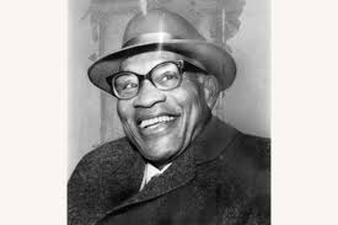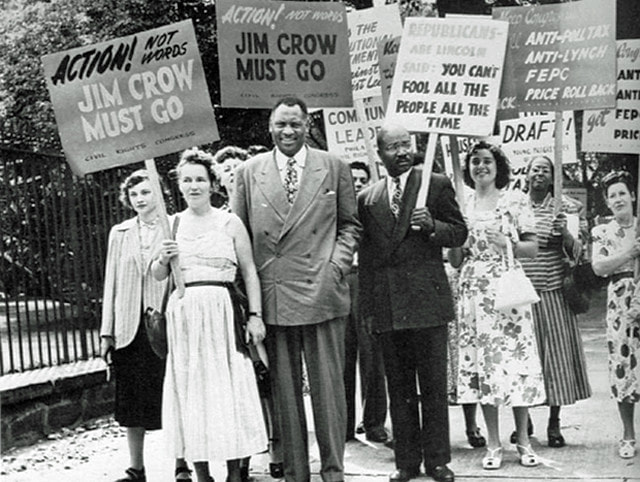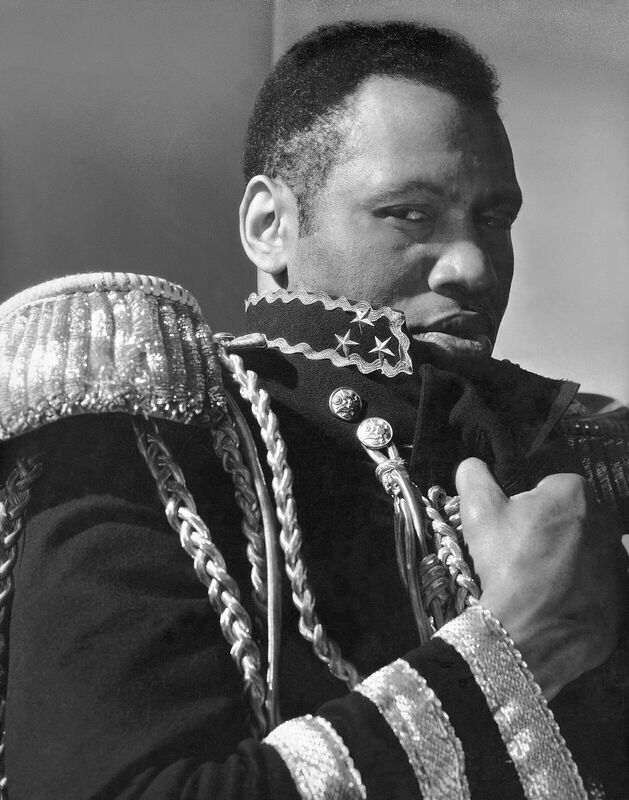|
Paul Robeson was a philosopher artist. Here we republish four of his writings, 'An Artist Must Take Sides', 'Primitives', 'I Want to be African' and 'Songs of My People' to make available the breadth and depth of his thinking.  The Artist Must Take Sides Speech at rally sponsored by National Joint Committee for Spanish Relief in aid of the Spanish Refugee Children, Royal Albert Hall, London, June 24, 1937-Daily Worker, November 4, 1937 Friends. I am deeply happy to join with you in this appeal for the greatest cause which faces the world today. Like every true artist, I have longed to see my talent contributing in an unmistakably clear manner to the cause of humanity. I feel that tonight I am doing so. Every artist, every scientist, must decide NOW where he stands. He has no alternative. There is no standing above the conflict on Olympian heights. There are no impartial observers. Through the destruction-in certain countries of the greatest of man's literary heritages, through the propagation of false ideas of racial and national superiority, the artist, the scientist, the writer is challenged. The battlefront is everywhere. There is no sheltered rear. The challenge must be taken up. Time does not wait. The course of history can be changed, but not halted. Fascism fights to destroy the culture which society has created; created through pain and suffering, through desperate toil, but with unconquerable will and lofty vision. Progressive and democratic mankind fight not alone to save this prevent a war of unimaginable atrocity from engulfing the world. cultural heritage accumulated through the ages, but also fight today to prevent a war of unimaginable atrocity from engulfing the world. What matters a man’s vocation or profession? Fascism is no respecter of persons. It makes no distinction between combatants and noncombatants. The blood-soaked streets of Guernica, that beautiful peaceful village nested in the Basque hills, are proof of that as are the concentration camps full of scientists and artists which in some western lands dot the countryside, bringing back the dark ages. The artist must take sides. He must elect to fight for freedom or slavery. I have made my choice. I had no alternative. The history of the capitalist era is characterized by the degradation of my people: despoiled of their lands, their culture destroyed, they are in every country, save one, denied equal protection of the law, and deprived of their rightful place in the respect of their fellows. Not through blind faith or coercion, but conscious of my course, I take my place with you. I stand with you in unalterable support of the Government of Spain, duly and regularly chosen by its lawful sons and daughters. Again I say, the true artist cannot hold himself aloof. The legacy of culture from our predecessors is in danger. It is the foundation upon which we build a still more lofty edifice. It belongs not only to us, not only to the present generation–it belongs to posterity--and must be defended to the death. May you rally every artist, every scientist, every writer in England who loves democracy. May you rally to the side of Republican Spain every black man in the British Empire. May your inspiring message reach every man, woman, and child who stands for freedom and justice. For the liberation of Spain from the oppression of fascist reactionaries is not a private matter of the Spaniards, but the common cause of all advanced and progressive humanity.
Songs of My People
Sovietskaia muzyka (Soviet Music), No. 7, July 1949, pp. 100–104 Translated from the Russian by Paul A. Russo There is an old Spanish proverb that goes: sing me your folk songs and I'll tell you about the character, customs, and history of your people. How true! Folk songs are, in fact, a poetic expression of a people's innermost nature, of the distinctive and multifaceted conditions of its life and culture, of the sublime wisdom that reflects that people's great historical journey and experience. This is as true of the very rich treasury of songs of the Russian and Ukrainian peoples, as it is of the wonderful songs of the Spanish, French, Czech, Italian, Polish, Chinese, Norwegian, Georgian, Armenian, and many other peoples of the world. This is utterly and completely true for the song culture of my people. I don't think I have to go into a detailed appraisal here of the great artistic merit of Negro folk music or of its unquestionable significance for all mankind. This is universally acknowledged. Even in capitalist America, where there exists racial discrimination of revolting proportions, where many "cultured" whites refuse to recognize the Negro as a human being—even there our folk songs constitute, as strange as it may seem, an object of national pride for many Americans. I am well aware that you in the Soviet Union, as nowhere else in the world, know how to honor and appreciate every artistic manifestation of a people's spirit, every genuine national art. I know, too, that Soviet audiences love and esteem the Negro people's songs, with which they have become familiar through the performances of such outstanding artists as Roland Hayes and Marian Anderson. I felt the full force of this passionate interest in and love of our folk songs during my own appearances in Moscow and Stalingrad. All the same, I also know that Soviet audiences are insufficiently acquainted with the history of Negro music and do not, perhaps, have a completely clear idea of the origins, sources, and the real content of Negro lyrics. This is all the more probable in that our official American musicology and music criticism have done everything to distort the Negro historical truth, to conceal the real social roots of Negro art, and to depict Negro culture as imitative, as permeated by the spirit of Christian meekness and slavish submissiveness to fate. This is why I should like to tell Soviet readers the truth about the songs created by the American Negroes, songs which bear the poetic impress of many facets of folk life, of the very nature and soul of the people, of its dreams and aspirations, of its long, hard struggle for the right to life, liberty, and independence. The music of the American Negro has its origins in the ancient culture of Africa. American Negroes are the direct descendants of various African tribes which–from the beginning of the seventeenth century–-English, Dutch, Spanish, and French merchant-plunderers began transporting en masse for sale to America. Torn from their native land and national culture, thrust into the most difficult conditions of slave existence amidst an alien and hostile population, the Negroes had to adapt themselves to an alien life, language, culture, and religion. The Christian religion, imposed by force, was one of the powerful weapons for the spiritual enslavement of the Negroes. Faith in the afterlife where all earthly sufferings would be compensated with heavenly bliss, and the preaching of meekness and submissiveness-these were the basic religious tenets which helped the white exploiters to keep in harness the mass of Negro slaves who were subjected to the most brutal treatment in their backbreaking labor for their masters. And yet this enslaved people, oppressed by the double yoke of cruel exploitation and racial discrimination, gave birth to splendid, inspired, life-affirming songs. These songs reflected a spiritual force, a people's faith in itself and a faith in its great calling; they reflected the wrath and protest against the enslavers and the aspiration to freedom and happiness. These songs are striking in the noble beauty of their melodies, in the expressiveness and resourcefulness of their intonations, in the startling variety of their rhythms, in the sonority of their harmonies, and in the unusual distinctiveness and poetical nature of their forms. In trying to explain this "miracle," some American musicologists are ready to ascribe the phenomenon of Negro Spirituals to the influence of English church music, Puritan psalms, etc. The unscientific nature and falsity of such explanations are easily demonstrated by pointing out that the white population among which the mass of Negroes has lived in the American South has never–not in the past, not at present–had a musical culture of song (including church singing) that is in the slightest way comparable in artistic merit to the Negro Spirituals. The so-called psalmody, that is, the Christian hymns which the Negroes could hear in church, represents primitive choral singing in a slow, strictly measured tempo with traditional cadences. Could this sanctimonious music really be the model for inspired folk singers? It would be wrong, of course, to deny the influence of church psalms or that of the folk songs of the immigrant population of America (the Scots, the Irish, the Spanish) on the development of Negro folk music. There were such influences. But they did not determine the distinctiveness and universal significance of the folk-song culture of the American Negroes. The power and beauty of Negro songs, the indigenous features that distinguish Negro folklore from culture, from the songs of all other peoples in the world, stem from ancient African songs, from the remarkable musicality which the Negroes inherited from their African ancestors. First of all, the idea has to be repudiated that African Negores were “savages”, people without culture. Many African peoples possessed their own distinctive and significant artistic culture long before the arrival of the European conquerors. They created their own language, distinguished-like Chinese-by the great precision and subtlety of intonational structure. They created a rich oral folklore, a distinctive decorative art (especially sculpture), and, finally, they possessed a highly developed and original musical art, distinguished by an extraordinary wealth of rhythm. Rhythm, the most intricate polyrhythmic constructions on the invariable and uniform pulsation of a basic, clear-cut meter–this is the basis of the musical speech of African Negroes. This basis has been fully preserved in the music of their American descendants. This characteristic syncopation, with all its rhythmic freedom and infinite variety, not only underwent its own development in Negro musical folklore, but also had a quite noticeable effect on the music of those peoples of North and South America among whom the Negroes lived. It is enough to become familiar with the folk music of Cuba, where Negro rhythms blend with elements of Spanish music; with the folk music of Brazil, which is based on Portuguese folk-song traditions fused with Negro influences; with the music of Haiti, which combines French and Negro features; and so on. I don't have to talk about the immense influence which Negro folk music has had on the development of the musical culture of the peoples of the USA. A particularly brilliant instance of this is seen in the works of the popular American composer of the middle of the last century, Stephen Foster, in whose numerous songs characteristic features of Negro music are distinctly perceptible. In still later times, these influences show up in full force in jazz. Rhythm is not the only feature which Negro music inherited from Africa. American Negro songs are close to African songs in the structure of their intonational harmony, in the improvising nature of their performing style, and in their form. But, of course, Spirituals are melodically far above their African forerunners. The American Negroes' sense of harmony is also highly developed. Let me relate here a story told by the well-known American historian of Afro-American music, Natalie Curtis-Burlin (Negro Folk Songs, Book III), about a certain German musician who visited Hampton Institute in Virginia and heard the singing of an immense chorus of Negro students. “Who worked with the chorus? This is remarkable!” exclaimed the musician. N. Curtis-Burlin's reply that no one had ever worked with the chorus did not satisfy him. "I mean," insisted the musician, "not who trained their voices (I understand, of course, that they sing without benefit of voice school), but who taught them the choral parts, who got them ready as a choral ensemble?"-No one. As N. Curtis-Burlin further relates, the nine hundred Negro boys and girls whose singing so impressed the German musician were not arranged and distributed by voice as in the usual chorus. The boys sat in a group on one side, the girls on the other. Each sang the part most comfortable for him within his normal range, free harmonizing the melody then and there during the singing. A first alto might turn up between two sopranos. A boy singing countertenor might be sitting next to a bass… "But the amazing, inspired singing of this immense chorus sounds utterly faultless in intonation; there is not the slightest deviation from tonality, and all without any accompaniment. " In fact, American Negroes have a remarkably developed flair for harmony. There is even a saying that aptly reflects this innate harmonic gift of the Negro people: "Put together the first four Negro fellows that come along and you've got a quartet." This tendency to harmonize melodies, such a natural phenomenon among the people, found its fullest expression in the performances of Spirituals (spiritual hymns), as well as in the performance of work songs (the so-called Plantation Songs), the performances of these usually being choral ones. The wealth and diversity of the melodic language of Negro songs is startling. A few examples here will suffice to show how freely and flexibly the melodic line moves, how expressive and noble is its outline, and how multifarious are the rhythmic-harmonic structures and forms of these folk songs. Here is one of the most splendid songs of my people: "Go Down Moses," a magnificent hymn, calling the people to the struggle for freedom. Go down, Moses, 'way down in Egypt land, Tell ole Pharoah, To let my people go. When Israel was in Egypt's land, Oppressed so hard they could not stand. . . etc. The forms of this song as in many other Spirituals are connected with religion. It would be a complete mistake, however, to conclude from this that the origins and content of these songs are purely religious. As I have already said, the Christian religion, propagated among the Negroes by force, was one of the strongest weapons for the spiritual enslavement of the people. The only book which the Negroes knew before the Civil-War period and the abolition of slavery (1863) was the Bible. Oppressed and persecuted, subjected to the curelest exploitation, the Negro people was very susceptible to the consolations promised by the Church. The Negroes sought in the Bible stories analogies with the history of their own slave existence, and drew from these stories faith in the coming retribution for their oppressors, faith in the triumph of truth and justice. The real content of the Spirituals in the overwhelming majority of cases was far removed from religious concepts. These were folk hymns, the poetical embodiment of the sufferings and struggle of an entire people, of its philosophy of life and its character, of its hopes and aspirations. The Spirituals reflected all the manifestations of the Negro people's social life. Therefore, the song "Go Down Moses," far from being a religious hymn, is rather an impassioned call to the struggle for the liberation of the Negro people. Moses, and the pharoahs, and the Jewish people are all merely poetic symbols which inspired the unknown singer who created this amazing song. Similarly, there is little that is religious in the song "Heab'n": I got a robe, you got a robe, All of God's children got a robe. When I get to heab'n goin' to put on my robe, Goin' to shout all over God's Heab'n. Ev'rybody talkin' about heab'n ain't goin' there, Goin' to shout all over God's heab'n. According to the testimony of the greatest Negro historian of the nineteenth century, Frederick Douglass, the heaven mentioned in this song is the North, the northern states of America where the Negroes, in contrast to the southern states, were not in bondage. In the minds of the benighted and downtrodden slaves of Alabama, Virginia, Florida, and Georgia, the northern states constituted that promised land for which the Negro population of the South yearned heart and soul. It seems to me that the same explanation fully reveals the real content of the song "Nobody Knows de Trouble I See": Oh, nobody knows de trouble I see, Nobody knows my sorrow... If you get there before me Tell them I'm comin'. With respect to genre, Negro musical folklore is very diversified. Along with a vast quantity of spiritual hymns, the American Negroes created a multitude of work songs, songs of lyrical content (the Blues), and dance tunes. Finally, recent investigations have for the first time revealed a whole new field of Negro songs–songs of protest, songs directly calling the Negroes to the struggle for their rights, and against lynch-law, against their exploiters, against capitalists. The work songs, as well as the songs of protest, are the fruit of collective creation. Their rhythm is born out of the work process. It may be the measured beat of the crowbar or pickaxe at excavation sites. It may be the synchronized movement of dockworkers loading barges. It may be the hard, monotonous work of the cotton pickers. These songs usually begin with an introduction by the leader that defines the rhythm of the work, and then the chorus joins in. Here is one model for such songs, “Cott’n Pickin’ Song,” created by the Negro cotton pickers of Florida: Chorus: This cott'n want a pickin' So bad! This cott'n want a pickin', So bad! Goin' clean all over this farm. Leader: When boss sold that cott'n, I ask for my half. He told me I chopped out My half with the grass. In the song there is a regular alternation between the refrain of the entire chorus and the recitative improvisations of the leader. The content of these improvisations, connected with the life of the given group of workers, at times is permeated by a venomous irony directed at the white bosses, at times has the character of a direct protest. A good example of a work song is the one I performed, "Water-Boy"; it, too, is built on the alternation between a free, recitative solo and a rhythmic, precise choral refrain. A special place in the corpus of Negro songs is occupied by songs of protest, which were first collected in the southern states in the nineteen-twenties by the American journalist, L. Gellert. These songs manifest in full measure the Negro workers' heroic revolutionary spirit, their hatred of their exploiters, and their yearning for the struggle for their human rights and freedom. The hard, exhausting work with a pickaxe or shovel in hand defines the rhythm and character of the melody. The example below gives a clear idea of the content of these songs: Sistren an' brethen, stop foolin' wid pray. When Black face is lifted, Lord turnin' away. Heart filled wid sadness, head bowed down wid woe, In his hour of trouble, where's a black man to go? We's buryin' a brudder, dey kill fo' de crime Tryin' to keep what was his all de time. When we's tucked him on under, what you goin' to do? Wait till it come dey's arousin' fo' you? Yo' head tain' no apple fo' danglin' from a tree Yo' body no carcass for barbacuin' on a spree. Stand on yo' feet, club gripped 'tween yo' hands, Spill dere blood too, show 'em yo's is a man's. While Spirituals, work songs, and songs of protest are collective creations and are performed collectively among the people, the blues (that is, lyrical songs, most frequently about love) express the emotional state of the individual. In the blues you frequently hear complaints about the evil fate of separation, about one's surroundings, about the hard and dangerous existence of a lonely creature in a faraway and alien big city. In contrast to Spirituals, many blues have authors. A popular Negro composer, for example, is William Handy, the author of many famous blues, including "Saint Louis Blues," "Florida Blues," "Memphis Blues," etc. The blues played a big role in the development of jazz and became the basis for contemporary dance (foxtrot, blues, tango). However, this is the topic for a special article and I cannot treat it in detail here. Let me just say that under capitalist conditions, where all forms and expressions of American art must subordinate themselves to the demands of the market, our native Negro music has been subjected to the very worst exploitation. Commercial jazz has prostituted and ruthlessly perverted many splendid models of Negro folk music and has corrupted and debased many talented Negro musicians In order to satisfy the desires of capitalist society. But, all the same, our splendid songs have survived and shall survive, enriching the real culture of America, providing my country's Composers with an inexhaustible supply of material for their creative work. Recent decades have seen the emergence of a series of talented Negro composers who have devoted their creative energies to the cultivation of the incalculable riches of our musical folklore. I list here such names as Samuel Coleridge Taylor, Henry Burleigh, Nathaniel Dett, William Dawson, William Grant-Still, Duke Ellington. These composers, each in his own way, have tried to find the way to creating a national Negro symphonic, oratorical, and operatic music. But these are so far just the first steps. We are still awaiting our Glinka who on the basis of Negro folk music will create a great, universally significant art, who will lay the foundation for a national school of composers. Meanwhile our serious composers find themselves in very difficult circumstances. Creatively and organizationally they are not united. Their material existence is far from secure. We are just now making attempts to unite Negro artists, performing artists, and musicians. For this purpose a progressive organization has been created in New York-"The Committee of Negroes in the Arts." Our dream is to establish creative contact with persons active in the Soviet Arts. We want to learn from your remarkable experience of building up a socialist culture; we want our art to be just as progressive and purposeful, just as national in spirit as the great art of the great Soviet people.
0 Comments
Leave a Reply. |
CategoriesArchives
May 2024
|



 RSS Feed
RSS Feed
